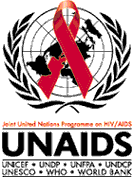

Men take their pleasure and women pay the price
Date: 30/11/2000
From: The Sydney Morning
Herald
When Lukio Nakitto was 10 years old she watched as her older sister was forced to leave their home in disgrace. Their mother cried out that the unmarried teenager was pregnant.
Shameful as the sight of a pregnant 18-year-old might be, it was a lie invented to hide what was considered an even greater horror - the sister, Hasifa Nanfuka, was infected with HIV.
Hasifa was banished, left to survive on her own.
And Lukio had barely celebrated her 12th birthday when Hasifa's old boyfriend, having also banned the teenager from his life once she was diagnosed, raped the little sister.
Today Hasifa is 27, fighting not only the human immuno- deficiency virus, but also tuberculosis that has infected her lungs.
And Lukio, a shy 19, also has AIDS, which she says gives her sharp headaches and makes her tire easily.
Lukio and Hasifa share an uneasy sisterhood.
Though both girls were virgins when they met the man, he is not the one who has paid the price for their HIV infections.
To survive, Lukio sews people's clothing, repairing tears and replacing buttons to earn the 6,000 shillings (about $8) a month that she needs for water and rent for a two-metre by two-metre windowless cell that fills with water during the rains and smells of mould during the dry season.
She has no toilet, bath or electricity.
Hasifa lives slightly better, thanks to her sales of macrame pot-hangers.
Across sub-Saharan Africa, women are more vulnerable than men to HIV infection, for biological and social reasons.
No strategy to control HIV's explosive growth in Africa or Asia can succeed, experts say, without directly confronting stark gender inequalities.
Few marriages are genuinely monogamous, and, according to a World Health Organisation report released this year, women's lack of control over their sexuality is the main reason they become infected with HIV.
The report said the root cause of women's subservience is poverty, since few of them have jobs that earn cash.
Biologically, said Nancy Padian, of the University of California, San Francisco, male-to-female transmission of HIV is far more efficient than the reverse.
This is particularly true when the female is very young, a virgin, or a victim of violent sex.
In 1990, Mary Idrisa's husband fell ill with AIDS at their tiny home in a village just outside the Lake Victoria seaport of Bukoba.
In the preceding years, Idrisa's husband saw three prostitutes regularly and married a second wife. All of them died of AIDS. For a year Idrisa nursed her husband and, at the command of her in-laws, spent scarce resources on useless medicines and witch doctor incantations.
Nevertheless, "when my husband died his parents blamed me", Idrisa said. "They say I killed their son with witchcraft.
"Relations are very bad. They even claim that the house will be taken by the clan and when I die I will not be allowed to be buried on the land."
The results of such female experiences can be seen on the burgeoning malnutrition wards of East Africa, where children such as three-year-old Renata weigh less than nine kilograms.
Renata's mother is in the AIDS ward of Bukoba General Hospital, the nurse explained, while the severely malnourished girl lies so lethargically as to seem inert.
Row upon row of these stunted babies have overflowed the pediatric wards. They are warehoused, two, sometimes three, to an infant-sized bed. The nurses say the numbers just keep mounting.
Newsday
This material is subject to copyright and any unauthorised use, copying or mirroring is prohibited.
This material has been posted with permission, all copyright is honored.

